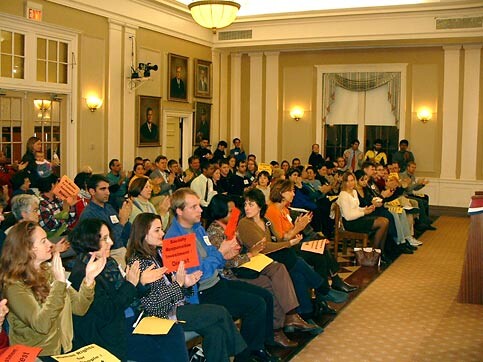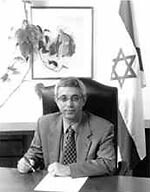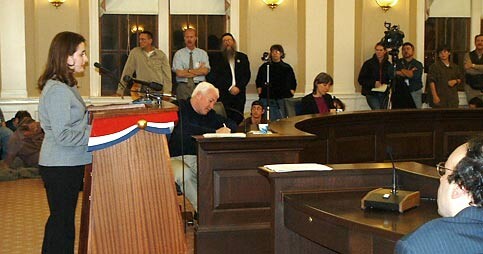The Electronic Intifada 16 November 2004

The audience at the meeting.
Tension and apprehension filled the air in the Boston suburb of Somerville, Massachusetts on the night of Monday November 8, 2004. The Somerville Board of Aldermen held a public meeting to consider a non-binding resolution to divest from Israel bonds and from companies who profit from the human rights abuses carried out by Israel against Palestinian people. If it passes, it will be the first such resolution in the world to be passed by a city. The Presbyterian Church and the National Lawyers Guild have already voted to divest and The Anglican Church is considering it.
Companies targeted include Caterpillar, United Technologies, General Electric, Boeing, and Lockheed Martin Corporation. Caterpillar has been the target of numerous boycott campaigns since American Rachel Corrie was killed by a D-9 bulldozer driven by an Israeli soldier. She was trying to protect the home of a Palestinian pharmacist from demolition at the time. Caterpillar’s D-9 is used by Israel to destroy homes (sometimes with people still inside). It is also used to destroy land, uproot olive trees and build the so-called separation barrier/apartheid wall. When complete, the wall may appropriate up to 45% of the occupied West Bank, including much of its most arable land and water resources.
For the past 18 months, the Somerville Divestment Project (SPD) has been educating residents of Somerville, Massachusetts about the 37-year long Israeli occupation of the Gaza Strip and West Bank, including East Jerusalem. SDP members have knocked on doors, stood outside mass transit stations, hosted film nights, and had individual meetings with many Aldermen in their homes. Through the process, they collected almost 1,200 signatures in support of the Socially Responsible Investment resolution.
Their hard work paid off last week when, on Tuesday, November 2, eight of eleven Aldermen cosponsored the resolution to divest. Though it almost passed, the resolution was sent to the Legislative committee for further discussion. Thus the hearing for Monday, Nov. 8 was set and the Aldermen invited the Israeli Consul General and representatives of the companies whose stock would be sold to present their case.
Hundreds filled the chamber Monday night as tension mounted. Supporters of the resolution held small signs that read “Somerville for Human Rights”. There was extra security at city hall and absolutely no backpacks were allowed into the building. The Israeli Consulate arrived with a police detail for body guards.
The hearing began with a display of power by opponents of the resolution that was clearly designed to intimidate the Aldermen. The Israeli Consul General, the Mayor of Somerville and State Rep. Tim Twomey expressed their opposition before the actual hearing began. Following this display there was one hour for each side to present speakers at 2 minutes each.
Supporters of the resolution, excited by the possibilities raised by such a hearing, were cautiously optimistic about the prospects of success. Opponents were incensed that such a hearing was taking place at all, that the Aldermen would even consider divesting from Israel, and that it almost passed the week before.

Israeli Consul General, Meir Shlomo.
As far as I could ascertain, his case against the resolution was that Israel was being singled out unfairly. Others would assert that it was anti-Israel.
Next up was Somerville Mayor, Joseph A. Curtatone, who had not participated in any of the previous meetings on divestment and who had declined opportunities to meet with Somerville residents and members of SDP to discuss the resolution. Mayor Curtatone concluded that the issue was “too complex”, that it “went back centuries” and that the aldermen should reject the resolution. With emotions already high, those opposing the resolution seemed exhilarated by the mayor’s guarantee that he would veto the resolution if it passed. The mayor then left before hearing from supporters of the resolution.
As Somerville residents spoke one after the other Monday night, they made clear that they do not want their money used to oppress and violate the human rights of others. Neither do they want to support companies that profit from those violations.
State Representative Tim Twomey called for a more constructive resolution that endorses the roadmap. But he made no suggestion as to what the City of Somerville could do to push the roadmap forward. Ariel Sharon’s senior advisor Dov Weissglass recently put to rest any notion that Israel had any intention of implementing the roadmap or creating a Palestinian State, which the roadmap calls for.
The aldermen have wrangled with these types of issues before when they passed resolutions against Burma, the Patriot Act and the war in Iraq However, never had they encountered such support for human rights violations. As one opponent of the resolution put it, “according to Donald Rumsfeld, the United States has determined that the Geneva Conventions do not apply to its war on terror, why should Israel be obliged to abide by them?”
More opposition to the resolution came from local labor leaders and from leaders of Brit Tzedek and Meretz USA. They claimed that the resolution would “demonize” Israel and once again we heard that Israel was being singled out unfairly. Steve Grossman, the local head of the Anti Defamation League (ADL) and former head of the American Israel Public Affairs Committee (AIPAC) which is currently under investigation for passing American top secret material to Israel, claimed that the resolution was anti-Semitic. Others went so far as to call for an investigation of SDP members.
Marty Federman, a Jewish educator and former board member and chair of the Social Action Committee of Congregation B’nai Brith in Somerville, pointed out that tactics including accusations of anti-semitism and personal attacks are commonly used against anyone who dares to speak out against policies of the Israeli government. He strongly supported the resolution based on its merits.
Larry Miller is a former president of Congregation B’nai B’rith, a congregation well represented on both sides. The outpouring highlights the deep divisions created by the issue within the community.
Mr. Miller was embarrassed by accusations of “anti-Semitism” by some of his friends toward people who support divestment. He told them that they should be ashamed of themselves. With that, supporters erupted with applause while Dr. Annique Kaplan, another of the Jewish supporters of the resolution, shouted “Thank you! Thank you! Thank you for saying that”!
As supporters of the resolution spoke, the actual issues surrounding it began to focus. First and foremost, the only foreign country that the City of Somerville is invested in is Israel. Thus, Israel had been “singled out” and given “special treatment” long ago. The purpose of this resolution, Liz Monin pointed out, was in fact to end the special treatment and demand that Somerville stop taking sides. She dispelled the claims that the resolution was “one-sided,” by quoting from the language of the resolution which she said “seeks to stop taking sides and instead take a stand for human rights for all people”.
The atmosphere in the room began to shift as proponents of the resolution and therefore of divestment, spoke eloquently about why they had become involved with the project. We began to hear about human rights violations and the oppression of Palestinians by the Israeli army and government. They explained why they support socially responsible investing.
Somerville resident Kevin Qazilbash spoke about the effects of collective punishment on children, and he said that, as a father and a teacher, he could not look his students in the eyes if he was not doing everything he can to work to end the violence against innocent Palestinian civilians. Qazilbash also made the point that he is against the violence perpetrated by both sides of the conflict, as did many people from the other side.

Hilary Rantisi speaks to the meeting.
Hilary Rantisi, a Palestinian American now living in Somerville with her American husband, spoke in a very personal way about her family and about her life. She acknowledged that as painful as her story sounded, that she has been privileged. Many more Palestinians have suffered much more than she. Many more continue to suffer. We met 15-year-old Khalil, who is an exchange student presently living outside of Boston. When home in Gaza City he cannot visit family members living just 18 miles away due to roadblocks and curfew. Several of his cousins have been killed over the past year and he was unable to attend their funerals. Just last week, his 16-year-old cousin, Hanin, was shot in the head by an Israeli sniper while she played with her little brother inside her house. She died instantly.
Lana Habash, another Palestinian American and Somerville resident spoke of the racism upon which the occupation is based. Last summer she traveled to the West Bank as an International. She relayed her eyewitness account of an Israeli soldier who shot a young Palestinian woman in the stomach and genitals right in front of her. “If this is what they do in front of us, you can only imagine what they are doing when we’re not looking,” said Habash.
Almost all of the speakers supporting the resolution, both Jewish and gentile alike, had in fact, traveled to the West Bank and witnessed first hand the “horror” of occupation. The only opponent who had been to the Occupied Territories was a former Israeli soldier who claimed that any killings of children or civilians were “mistakes”. Meir Schlomo had also acknowledged that “mistakes” are made by democracies but claimed Israel second to none in rectifying them. He did not cite any examples of such rectification.
Shamai Leibowitz, an Israeli attorney who had come in support of the resolution, quickly dispelled that myth. He recounted that as a young Israeli soldier he was ordered to commit war crimes in the Occupied Palestinian Territories. “My platoon meted out collective punishment on whole Palestinian communities, arrested and detained Palestinians without charge, demolished their homes, shot live ammunition at unarmed civilians, killed women and children, and arbitrarily destroyed crops and property”. Leibowitz now refuses to serve in the Occupied Palestinian Territories.
As a former Israeli soldier and an Orthodox Jew, Leibowitz felt compelled to emphasize the urgent need for divestment. “The flow of money that facilitates Israeli war crimes and gross human rights violations which have been going on for nearly 40 years in the Occupied Palestinian Territories must be stopped”. He, like many others, made the point that “only through divestment will Israel be forced to end the occupation and therefore achieve peace and security for both Israel and Palestine”.
During the hearing last week, five of the aldermen thanked the SDP for bringing the plight of the Palestinian people to their attention. They had known little about the issue. Many of the people in the room on Monday had probably never listened to such impassioned and honest descriptions of the West Bank and Gaza, or heard an honest explanation of why divestment is important.
When I got up to speak, I addressed the question of why the aldermen had known so little about the issue. I explained how the media works in the US on this issue, that after 22 years of badgering by CAMERA and now “Honest Reporting” as well, the US media is afraid to report on anything Israel is doing in the West Bank and Gaza. Just last week, international observers watched as CNN filmed an Israeli soldier shoot a Palestinian child who was throwing rocks. CNN refused to air the footage or even talk about it. I also told the crowd that “because of this experience you no longer have the luxury of ignorance. Now that you know what is being done with your money, you have a responsibility to stop it, to approve the resolution and support responsible investing”.
As if to underscore my point on media bias, the Boston Globe ran a story Tuesday, November 9, entitled “Proposal to Divest Israel Funds Sparks Outrage”. Roughly 80% of this story was on the opposition to the resolution. The author, Benjamin Geden, does not even appear to have read the resolution.
The vote has been put off until Dec. 9, 2004. No doubt, attempts to influence the Aldermen by both sides of the issue will continue. Regardless of the outcome, people had a real opportunity to hear each other, not a common occurrence on this issue. Nancy Murray of Boston Committee for Palestinian Rights saw this night as a watershed in the struggle for peace and justice for Palestinians and Israelis. Let’s hope so.
Related Links
Tom Wallace is the former Media Coordinator for the International Solidarity Movement, and the Executive Director of MidEast Focus, a communications awareness project. Contributions can be made to Somerville Divestment Project, PO Box 441259, Somerville, MA 02144, USA, or visit our website at www.divestmentproject.org and click the ‘Contributions’ button.




